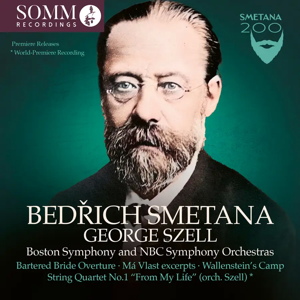
Bedřich Smetana (1824-1884)
The Bartered Bride, overture (1866)
Wallenstein’s Camp (1859)
Má Vlast: Vltava and From Bohemia’s Fields and Forests (1874-1879)
String Quartet No.1 ‘From My Life’ (1876, orch. George Szell)
NBC Symphony Orchestra, Boston Symphony Orchestra (From Bohemia’s Fields) / George Szell
rec. 1941-1945
SOMM Ariadne 5032 [74]
The 200th anniversary of Smetana’s birth hasn’t been met by a deluge of discs. Supraphon has boxed some of its operatic back catalogue into an affordable, chunky box but I don’t think Pentatone’s recent Má vlast, for example,offers much that posterity will care to hear. SOMM’S own contribution comes emblazoned with the dreaded straplines ‘Premiere releases’ (on the front) and ‘First releases’ (on the back) but aside from tautology this is, I’m afraid, to overlook that Pristine Audio released much of this material back in 2108 on PASC453. Their release focused on George Szell’s live NBC performance on 8 March 1941, so the only additional pieces here are Wallenstein’s Camp from 1942, again with the NBC, and From Bohemia’s Fields and Forests, from Boston in January 1945. All the performances are live.
Given the use of much of the same material I’ll reprise, with some amendments, what I wrote about the January 1941 performances in my previous review.
“George Szell was invited to conduct Toscanini’s NBC Symphony and his concerts in March 1941 were critically well received. This is the second of them, an all-Czech affair in which Szell was radio-announced as a Czech conductor, doubtless as a result of his near-decade tenure in Prague. It shouldn’t be forgotten that it was Szell who conducted the Czech Philharmonic in Casals’s famous recording.
According to Michael Charry’s biography of the conductor, Szell had pondered his Smetana arrangement for two years noting that ‘far from being a crime, it was almost a duty’ to arrange it. This was its public unveiling. As noted, the concert was well received but one critic complained that the resultant arrangement was ‘clangorous realism’ rather than the original’s poetic imagery. There’s a certain truth in that criticism, given that the arrangement inevitably bloats the music beyond its natural confines, and the principal objection rests with the percussion and brass, in particular, which strike a rather too overtly extrovert sonic position. But it is played with convincing trenchancy and commitment by the orchestra which had doubtless been thoroughly drilled by Szell, whose repeated insistence in NBC rehearsals had annoyed even Toscanini. Szell clearly cleaved to the work as he performed it in his debut with the Cleveland Orchestra in November 1944 – this concert has been preserved and was released on Music & Arts – and went on to record it with the orchestra in 1949.
He actually opened this NBC concert with the overture to The Bartered Bride which, perhaps oddly, he only got around to in the studio in 1955 when he played it in almost exactly the same way as here, almost to the second. He vests the music with natural buoyancy always exciting but controlled. A slightly over-emphatic Vltava is also included.”
This leaves just the buoyantly-directed From Bohemia’s Fields and Forests and an excellent Wallenstein’s Camp which, for years, was dominated on disc by the recordings of Kubelík and Jeremiáš – the former rather more than the latter.
Somm’s disc has been remastered by Lani Spahr and he seems to have added a subtle quotient of reverberation and depth to the sound to mitigate Studio 8-H’s dead acoustic. I happen to prefer his approach to the more interventionist work of Pristine’s XR technique, which tends to exaggerate the sonic picture. Spahr also contributes a useful booklet note.
Jonathan Woolf
Recording details
8 March 1941 (Bartered Bride. Vltava, String Quartet), 13 January 1942 (Wallenstein’s Camp), Studio 8-H, Radio City, NYC, USA
19 January 1945 (From Bohemia’s Fields and Forests), Symphony Hall, Boston, USA
Buying this recording via a link below generates revenue for MWI, which helps the site remain free.



















